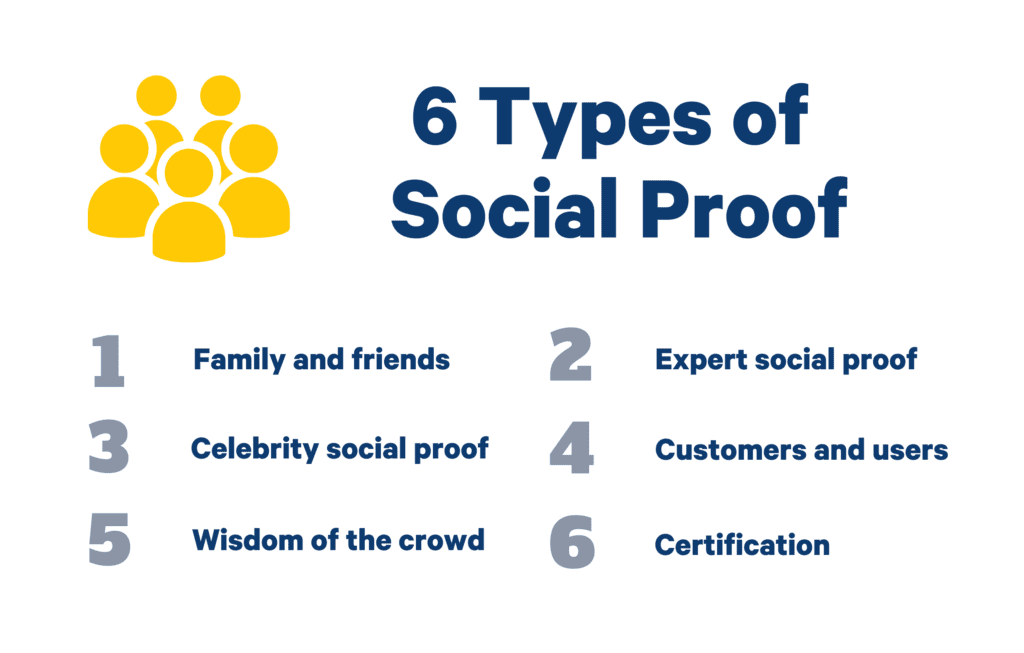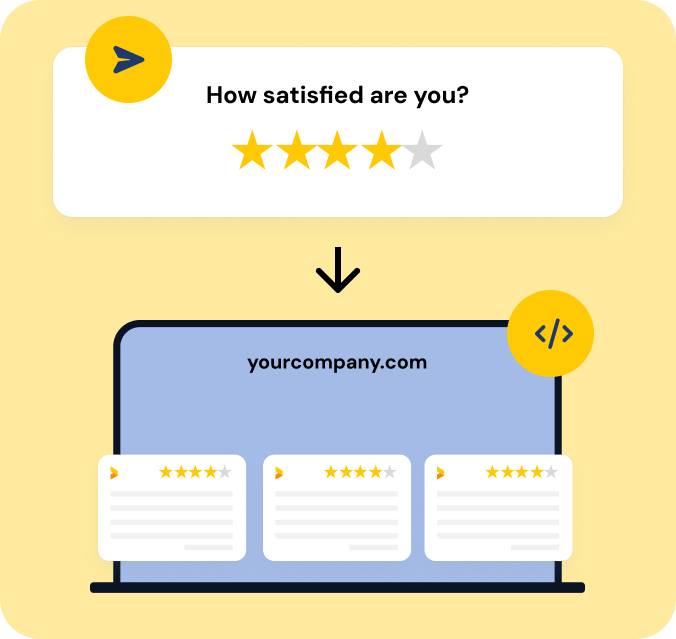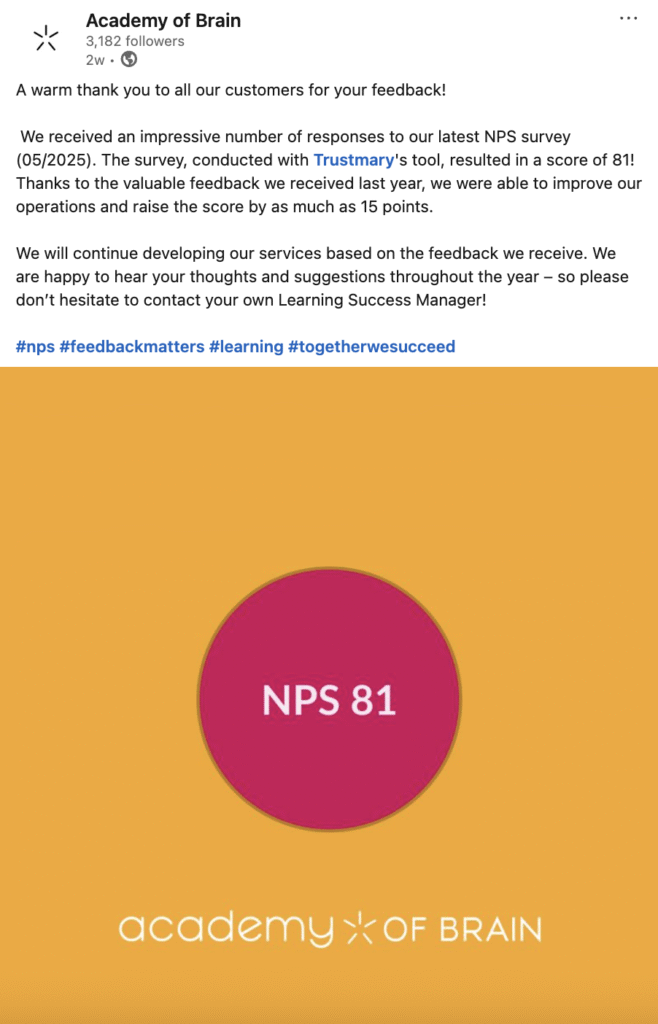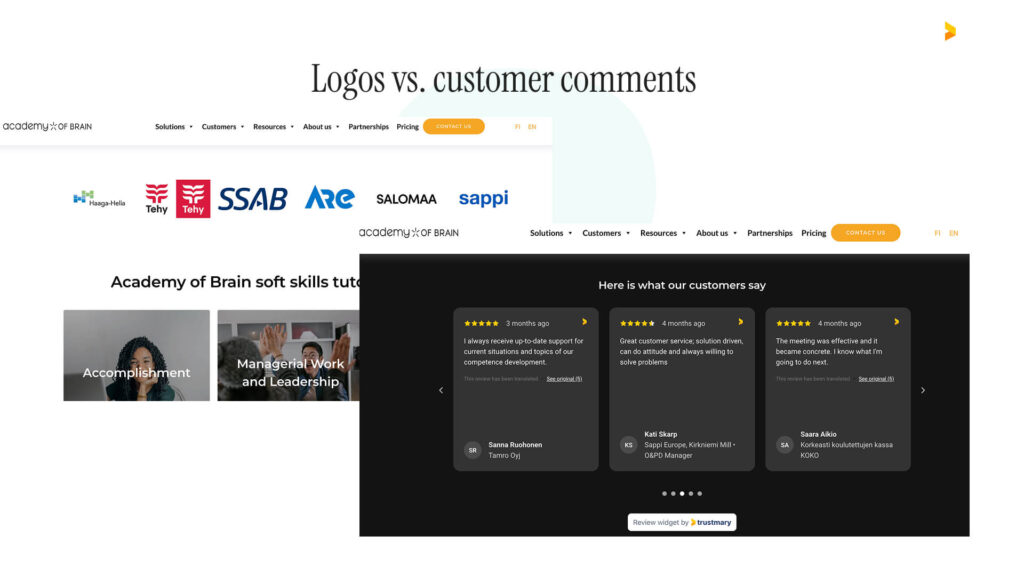Social Proof Examples in B2B Marketing +How to Use Them


When you’re considering a new product or service, what makes you trust it? Is it the bold claims in the brochure or the price tag that catches your eye?
More often than not, your decision is guided by what others have experienced.
In this article you will learn about different forms of social proof, how to use user-generated content in your marketing and see great examples of successful use of social proof implemented by B2B brands.
Start taking advantage of the wisdom of the crowd and read more! B2B online reviews are more crucial than ever before.
What Is Social Proof?
Social proof is a psychological phenomenon that makes people act like their peers. Humans are social animals. We look at our social group for reference about what we should do or think.
If you think about it, social proof is present in every day of your life. Even if you are not aware of it, you probably accommodate your behavior according to how your friends behave. You might talk differently when you are around your coworkers or clients as compared to when you are with family.
If you look up to a celebrity, you probably believe what they say even though neither of you know all the facts.
If you see many people taking part in a conversation on Reddit, TikTok or X, you are more likely to also say something, but you will not be the first commenter.
Social Proof and Consumer Behavior
Social proof of course affects consumer behavior, too. If a business or product has a bad reputation or our friends say that they were disappointed in a purchase, the chances are that we will not trust that business or product either.
On the other hand, a recommendation can make you want to buy something as well. If you notice that there is a new trending restaurant nearby that all your friends like, you also want to go there.
After discussing how social proof affects you, we can move on to how your business can take advantage of social proof.
In case you don’t believe me, let me introduce you to some facts about social proof:
- 40% of consumers rely on recommendations from friends and family when looking for new brands
- Almost 70% of customers read online reviews before the decision to purchase something
- Over 92% of B2B buyers are more likely to make a purchase after reading a trusted review
Convinced yet?
You can also harness the phenomenon of social proof to increase conversions. I will guide you through some practical advice and real life examples of social proof in this article.
6 Different Types of Social Proof
As stated earlier, people tend to rely on word-of-mouth and recommendations from trusted individuals rather than advertisements. But who are the trusted people that your customers listen to?
Well, the answer is found in these six types of social proof:
- Family and friends
- Expert social proof
- Celebrity social proof
- Previous customers and users
- Wisdom of the crowd
- Certification

People will be more likely to purchase your product if you showcase some form of social proof in your landing page, social media or other communication channels.
Whereas all of these six types of social proof work on an individual customer, B2B marketing might be a different story. Some forms of social proof need to be modified for B2B marketing, as the purchase motives are different between individual consumers and companies.
Incorporate Social Proof on Your Website
In this section I will cover some tactics for using social proof that you can incorporate easily. They are simple but make a great difference.
Appeal to the Social Animal
Social proof can be as simple as using phrases on your website that imply the sense of community. When people see that other people are using your service, they will trust you more.
For example:
“Join our ever growing family of happy users!”
“Businesses from all around the world have increased their sales with the help of your software.”
“We are trusted by over 1000 companies.”
While language like this is an important part in attracting potential customers, make sure to back your claims with some solid proof.
What if you don’t yet have a large customer base? Claims like this would be straight-up lying.
One resolution could be to showcase your existing customer’s logos on your website. If the businesses are willing to be associated with you, they must be happy customers, even if there are not too many of them.
If you do have lots of customers, you can still apply this strategy, but only showcase the most well known companies.
Numbers
Businesses want to know the exact value that you can bring to the table, and they want proof. Collect data about your success and display it online and in social media.
“90% of our customers were able to increase conversions last year.”
“We have now helped 500 companies in 10 countries to reach a 60% increase in sales.”
If you collect reviews and ratings, don’t forget to exhibit proof of your good ratings.
On the other hand, if you don’t have many reviews, you might want to wait until you have enough. Wisdom of the crowd can only be convincing when there is an actual crowd - not just a handful of people.
Awards and Badges
As you remember, certification is one way to use social proof.
If you have received acknowledgement, remember to show proof of it to the visitors of your pages. Present your badges on the landing page.
Endorsements
People look up to certain personalities. Endorsements from these people have the power to bring more customers to your side. I am talking about celebrity social proof and expert social proof.
The difficult part is to figure out your target audience and which celebrity or influencer they look up to. In B2B marketing you might target several industries, and finding common ground with all of them can be tricky.
But if you succeed, you can contact experts and celebrities to increase social proof.
Utilize expert social proof by asking for a review from an industry expert or high profile business. This will make a good impression on those brands who are still sitting on the fence.
Celebrity endorsements might not be that common in B2B marketing, but using that type of social proof is still possible. If you have a tech company, it might be beneficial to partner up with an influential expert from your field that can promote your product.
Especially a social media endorsement by an influencer can reach a broader audience and cater to the wisdom of the crowd.
And of course, customer reviews are an essential part of your marketing plan, which I will prove to you next.
User-Generated Content as Social Proof
In B2B business, the most important endorsements probably come from users who have positive experiences about your product or service.
Happy customers can provide social proof through user-generated content (UGC). UGC is any content that the user a.k.a. customer creates regarding your brand. It can be featured on your website and social media, or on separate platforms.
Some examples of social proof that is generated by users are
- Customer reviews
- Testimonials
- Social media posts
- Case studies
While reviews and social media posts might be more unpredictable in terms of their content, testimonials and case studies are a great and more controlled way to collaborate with satisfied customers and showcase social proof to new potential customers.
Review
Customer reviews are a great way to leverage the wisdom of the crowd, especially if your product or service is great and customers enjoy it. Reviews can also boost your appearance in search engines.
Like Tom Golubovich from Ninja Transfer states, sometimes reviews can "make or break the sale":
"As a primarily B2B-oriented eCommerce business, we've seen cases where client reviews literally make or break the sale. Business owners love reading reviews and recommendations from other decision-makers, as long as they can call, discuss, and confirm each review. In short, customer reviews play a huge role in building trust and driving sales & conversions."
Tom Golubovich, Head of Marketing, Ninja Transfers
Reviews are often featured in designated review sites like Google, TripAdvisor or Yelp. They can be as short as a star rating, or include a few sentences. You can also include reviews and ratings on your brand’s Facebook pages and your website.
Reviews are most effective when there are many of them: most customers read several reviews before making a decision about a purchase.
- 49% of customers consider the quantity of reviews an important factor
- On average, consumers read 10 reviews before deciding if they trust a business
- Having five product reviews can increase conversion rates by 270%.
- On the other hand, 94% of consumers have decided to not purchase because of negative online reviews.
The numbers show that reviews have a great impact which can affect the purchase decision in a positive or negative way.
What if I receive a bad review?
Fear not! Even if you receive bad reviews, you can turn them to your advantage.
Review Trackers’ 2022 report shows that industry leaders have a higher response rate and shorter response time to reviews. The most successful brands in each industry answer significantly faster than the industry average.
The report also suggests that people will not trust brands that censor reviews. Having a few not-so-great reviews makes your company appear more honest and transparent.
After all, anyone could just buy reviews, so having only overbearingly positive experiences looks suspicious.
Testimonial
Testimonial is a type of social proof that is pleasant for you and your customers, and impactful for visitors.
Unlike review, testimonial is usually rather positive than negative. That makes sense, since companies request testimonials from happy customers and showcase them on their own website, where visitors can see them.
A testimonial can be written or even in a video form. In a testimonial, the customer can show their face, name, title and workplace. This creates a more trustworthy effect than an anonymous review.
Ask for a testimonial from a well known expert to harness expert social proof for driving your sales and swooning your visitors. A celebrity testimonial can have the power to reach a larger audience.
Would you like to start collecting customer testimonials right now?
Trustmary is a customer testimonial software you can use to ask your customers for written or video testimonials, and incorporate them into your website.

Social Media Post
You can ask your customers to post about their experiences on their own social media accounts, such as Facebook, Instagram, Twitter, and others.
Ask your customers to tag you in their posts, to use a specific hashtag and to let you share the content in your own social channels.
In case your customer happens to have lots of followers who also belong to your target audience, their Instagram posts might work as well as influencer marketing. The difference is that their endorsements come from the heart.
In a best case scenario you gain new traffic, more followers and a public stamp of approval for your products and services.
If you get extra lucky, your hashtag might even trend and majorly boost your recognizability. If you manage to stir up conversation, you might even get coverage in the traditional media.
Another way is to simply make so good content that users want to interact with it and continue the conversation. Also, make sure that the content is easy to share on various platforms.
Here's an example of how our customer has mentioned Trustmary on their LinkedIn post.

Additional idea: if you have a celebrity in mind that could be of interest in your industry, why not ask them to make a guest post on your social media?
Case Study
Case studies are almost like next level testimonials. You collaborate with your customer to create their story and showcase how your product or service helped their business.
The case study can be featured online on your page, your social media, or in printed form like brochures.
Your website visitors will be dazzled by a case study about your most well known customer, but they are also interested in how you have helped companies that are similar to theirs. When possible, feature brands of different sizes and from different industries.
Most businesses would not turn down a case study, as it is an advantage for them personally, too. After all, it is almost like a dual advertisement for both parties, as the client gets to highlight their product or service as well.
3 Real Life Examples of Social Proof in B2B Marketing
Let’s look at some real live examples of social proof that B2B companies have used.
1. Accounting Firm: Boosting Online Visibility and Trust Through Reviews
Mandaatti, a Finnish accounting firm, discovered that authentic customer reviews not only enhance credibility but also improve visibility in AI-driven tools and search engines.
By collecting verified reviews with Trustmary and showcasing them online, Mandaatti increased its presence in local search results and even started appearing in LLM (Large Language Model) responses, making the firm easier to find for potential clients.
Their case shows that consistent, high-quality customer feedback can serve both as SEO fuel and reputation proof, positioning Mandaatti as a trustworthy expert in a competitive industry.
Read more about appearing in AI searches and setting up a Trustmary review page to copy this tactic.
2. Academy of Brain: Voice of the Customer Drives Sales and Marketing
Academy of Brain used to rely heavily on well-known brand logos to build credibility. However, they found that genuine customer voices were more persuasive than corporate partnerships.

With Trustmary, they began collecting real feedback from course participants and featuring it on their website.
This shift toward human-centered social proof increased conversion rates and website engagement.
The result: prospects could identify with authentic experiences and felt more confident investing in the company’s digital learning solutions. Academy of Brain’s success underlines the importance of letting customers speak for your brand.
3. Vainu: Turning Feedback Into Sales Momentum
Vainu, a sales intelligence platform, recognized that feedback and social proof were key to their growth strategy. Using Trustmary, they automated feedback collection and displayed customer testimonials across marketing channels, from landing pages to social media.
This created a continuous flow of new social proof that directly supported sales teams, strengthened trust among leads, and improved conversion rates.
For Vainu, the ability to leverage reviews dynamically, wherever potential customers engaged, proved that social proof isn’t just about collecting praise, but about using it to drive revenue.
– I think the most valuable thing about reviews, case studies, and references is that the person gave their face and name to showcase publicly, summarizes the VP of Marketing at Vainu.
What These B2B Examples Teach About Social Proof
These three cases, Mandaatti, Academy of Brain, and Vainu, highlight a shared truth: social proof isn’t just a marketing add-on. It’s a strategic growth driver when used deliberately.
Across industries and business models, the same pattern emerges:
- Visibility grows with authenticity:
Mandaatti’s reviews helped them appear more prominently in both traditional search and AI-driven discovery tools. Genuine feedback increases digital footprint and credibility simultaneously. - Conversions rise with relatable voices:
Academy of Brain learned that personal, honest customer stories outperform polished corporate references. Real experiences build emotional connection and accelerate decision-making. - Sales strengthen through automation:
Vainu’s success shows that collecting and displaying feedback shouldn’t be a manual process. Automation ensures social proof flows continuously fueling marketing, sales, and reputation management.
Together, these examples prove that social proof is most powerful when it’s easy to collect, authentic, and visible across every customer touchpoint.
How Trustmary Helps Get and Use Social Proof
Trustmary brings all these elements together in one streamlined platform:
- Collect: Gather feedback and reviews automatically after customer interactions.
- Analyze: Understand satisfaction levels and identify opportunities for improvement.
- Display: Publish your best reviews directly on your website and social media with dynamic widgets.
- Grow: Build trust, boost visibility, and turn happy customers into your most persuasive advocates.
Whether you’re a home improvement business, a B2B company, or an international SaaS provider, Trustmary helps you turn feedback into growth.
FAQ
Why should I implement social proof in my marketing mix?
You should implement social proof if you want to accelerate your sales.
Statistics show that people are more likely to trust a brand that other people have reviewed, especially if they deem the reviews honest and authentic.
Social proof works like magic. If you want to affect the opinion of a group of people, one of the most effective ways is to show that other people trust your brand as well.
This is why I talk about “the wisdom of the crowd”.
What types of social proof are there?
The six types of social proof are:
- Proof from family and friends
- Expert social proof
- Celebrity social proof
- Proof from previous customers and users (= testimonials)
- Wisdom of the crowd
- Certification.
Where should I display my social proof?
Publish your reviews where they’ll build the most trust:
- On your homepage and product pages
- Inside email campaigns
- On landing pages and social media
Trustmary offers ready-made, customizable all-in-one review widgets that automatically update when new reviews come in, keeping your website fresh and trustworthy.
How can I start gathering user social proof?
Start by sending a simple feedback survey to your customers. Ask how satisfied they are and invite happy respondents to publish their feedback as a review. This way, you collect both private feedback and public testimonials in one process.
With Trustmary, you can:
- Measure satisfaction (e.g., NPS or star rating)
- Automatically ask happy customers to leave a review
- Keep negative feedback private
This approach ensures you get a steady flow of authentic reviews without extra effort.

